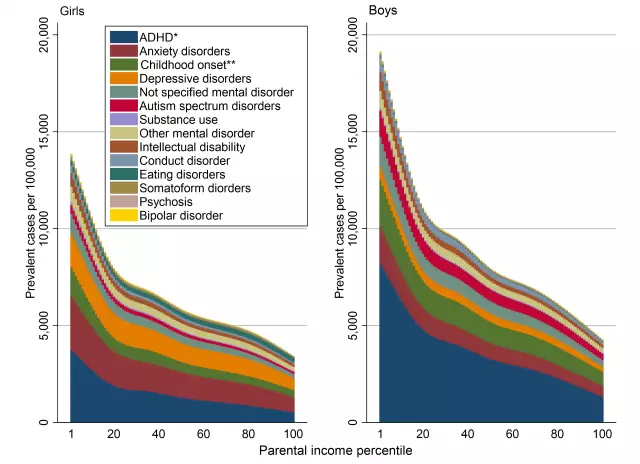- Author Rachel Wainwright [email protected].
- Public 2023-12-15 07:39.
- Last modified 2025-11-02 20:14.
Emotional lability

From the point of view of the physiology of higher nervous activity, emotion means an impulse to action. The word is derived from the Latin verb "emovere" - I excite. With regard to emotion, the object of excitement is the cerebral cortex, which generates a mental reaction. According to the teachings of academician Anokhin, any motivation is generated by emotion. Moreover, before the launch of the functional system, any emotion is considered negative until a positive result is achieved. If the goal is unattainable, the emotion will remain negative. When the human nervous system is weakened, emotional lability arises, which is characterized by an instant reaction to any stimuli. It doesn't matter what sign - "plus" or "minus".
An emotionally labile personality reacts equally sharply to positive and negative stressors. Changes in the environment cause an instant, violent reaction. A person cries with happiness or, conversely, resentment generates hysterical laughter. This is where emotional lability is manifested, in contrast to stability. The opposite state is called rigidity in psychology, and emotional flattening in psychiatry. Lack of emotion is much more dangerous to human health. Loss of motivation leads to exhaustion faster than an explosion of emotions.
Emotional lability: symptoms
Disorders of an emotionally unstable personality are characterized by impulsivity, spontaneity of actions in the absence of self-control and without taking into account the possible consequences. In this case, affective outbursts arise for insignificant reasons. In psychiatry, borderline states include emotional lability, the symptoms of which appear depending on the personality structure. There are two types of emotional weakness:
- Impulsive;
- Borderline.
With an impulsive emotional disorder, a persistent state of dysphoria develops, that is, an evil-melancholy mood, interspersed with outbursts of anger. People who have emotional lability are quarrelsome in the team, because they always claim leadership without considering their own abilities. In family life, excitable individuals express dissatisfaction with daily worries, considering them routine and not worthy of attention. Therefore, conflicts often arise, accompanied by smashing dishes and the use of physical violence against family members. The person is unyielding, vindictive, vindictive. In the absence of progression, emotional lability smoothes out with age, and by the age of 30-40, easily excitable men calm down, "gaining life experience." In women, as a rule,violent emotional outbursts are a thing of the past after the birth of children. This is due to a change in hormonal levels during childbearing.
Under unfavorable conditions, patients lead a hectic life, often resort to alcohol, which leads to the commission of aggressive antisocial acts.
Borderline personality disorders are characterized by increased impressionability, vivid imagination, and increased enthusiasm. This emotional lability breeds workaholics. People with BPD are easily influenced by others. They easily and with pleasure adopt “bad habits”, norms of behavior that are not encouraged by society. Borderline personalities run from one extreme to the other, so they often end marital relationships, quit their jobs, and change their place of residence.
Emotional lability in children
The society has accepted the point of view that capricious children are the result of poor upbringing. This is true, but only partially. There is a relationship between lack of attention and the development of neurasthenia syndrome in a child. The entrenched emotional lability in children leads to nervous exhaustion, which, in turn, enhances the mental reaction. The kid requires increased attention, therefore, arranges "scenes". This is typical for hysterical personality development. People with such a psychotype, as they say, are difficult to please. Strict upbringing generates protest, increasing emotional lability, indulgence in any whims leads to similar results.
If, from the point of view of those around, the child is not deprived of attention, the cause of heightened perception of changes in the environment should be regarded as the development of neurosis. The neurotic disorder, in turn, must be treated.
Emotional lability, treatment of neuroses

The causes of neurotic states are traumatic situations. When the cause is eliminated, emotional lability disappears - treatment by a psychiatrist guarantees positive results with timely treatment. It is necessary to pay attention to the child from a young age. Manifestations of negativism - denial of the demands of adults - should alert parents.
When emotional lability develops in old age, drugs for treatment are aimed at improving blood circulation in the brain. If nervous excitability is caused by organic lesions of the nervous system, emotional lability also appears, the treatment of which is to combat the underlying disease. This is the work of neurosurgeons and neuropathologists.
Over-the-counter nootropics are indicated for all types of emotional instability. Herbal sedatives have a good effect.
There is a big difference between conventional wisdom and medical diagnoses. Especially when emotional lability develops, drugs for the treatment of which should be taken only on the recommendation of a specialist psychiatrist. The help of a psychologist, of course, has a positive effect, but does not eliminate the causes of mental disorders.
YouTube video related to the article:
The information is generalized and provided for informational purposes only. At the first sign of illness, see your doctor. Self-medication is hazardous to health!






